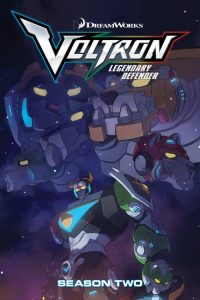 I’m continuing on with my 2020 Resolution Project, doing a rewatch and review of some of the great animated series you can find on Netflix. First up: Voltron: Legendary Defender, the reworking of the classic 1984 animated series Voltron (which is in and of itself a reworking of Toei Animation’s Beast King GoLion).
I’m continuing on with my 2020 Resolution Project, doing a rewatch and review of some of the great animated series you can find on Netflix. First up: Voltron: Legendary Defender, the reworking of the classic 1984 animated series Voltron (which is in and of itself a reworking of Toei Animation’s Beast King GoLion).
My post on season one is here, and I break down everything from story and characters to visuals and voice acting. For your enjoyment, you can expect the same treatment for season two onwards.
Suit up and grab your lions! It’s time to FORM VOLTRON!
The Premise:
DreamWorks’ Voltron Legendary Defender reimagines one of the most popular fan-favorite shows of all time in this all-new, comedic, action-packed series. Five unsuspecting teenagers, transported from Earth into the middle of a sprawling intergalactic war, become pilots for five robotic lions in the battle to protect the universe from evil. Only through the true power of teamwork can they unite to form the mighty warrior known as Voltron, who was first formed 10,000 years ago.
Discussion: Fresh off of season one’s cliffhanger, we’re flying headfirst into an immediate, dangerous situation: the Paladins of Voltron have been separated; the wormhole they used to flee the Galra has collapsed. We open the season right up with each stranded Paladin and their attempts to reunite with each other and survive their strange and possibly deadly new surroundings. This is the immediate problem that must be solved; but as the season continues, there are new threats, new conflicts, and new worlds. With that juicy setup, how’d the rest of season two do?
Spoilers below!
 Story: I really enjoyed where Season Two took us. We got a mix of the traditional space exploration fantasy as Team Voltron was sent to various regions of the galaxy, and then we’ve got an action-packed, “Let’s take down the bad guys!” epic. Of course, there was more! We learned about our intrepid Paladins as every character was tested in some shape or form this season. We learned that people are not what they seem — the Galra is not an evil monolithic race; there are allies and enemies to be found across lines and planes and worlds. We learned more about quintessence and that the connection with the Lions is far more mystical (and psychological!) than what we knew before; we’ve had best-laid plans come together and fall apart in captivating ways. This season featured everything from comedic asides (Hello, Space Mall!) to emotional loss and sacrifice — and everything in between.
Story: I really enjoyed where Season Two took us. We got a mix of the traditional space exploration fantasy as Team Voltron was sent to various regions of the galaxy, and then we’ve got an action-packed, “Let’s take down the bad guys!” epic. Of course, there was more! We learned about our intrepid Paladins as every character was tested in some shape or form this season. We learned that people are not what they seem — the Galra is not an evil monolithic race; there are allies and enemies to be found across lines and planes and worlds. We learned more about quintessence and that the connection with the Lions is far more mystical (and psychological!) than what we knew before; we’ve had best-laid plans come together and fall apart in captivating ways. This season featured everything from comedic asides (Hello, Space Mall!) to emotional loss and sacrifice — and everything in between.
Voltron: Legendary Defender continues to be a series that can accomplish 100 different things at the same time, and do so in a way that is simultaneously brash and subtle. The stakes are high, the adventure gets darker and more complicated, and the surprises keep coming, but we can count on Team Voltron and their relationships to be the constant thread throughout.
Characters: This is a development-heavy season, because large chunks of the plot are very much character driven. Season Two continues themes established in Season One — that people are stronger together than on their own — and further explores ideas on connection, identity, and one’s place in the universe. While Shiro and Keith have the largest character explorations of the season (and some additional whoppers: Keith is Galran! Haggar is Altean!), we still get moments of existential crises where the Paladins and Team Voltron have to contend with the notion that what they think they know is wrong (or at least, the picture is incomplete).
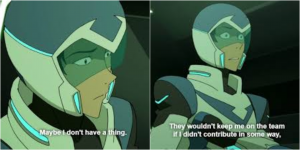 There are many moments that test our heroes and make them question themselves and their role to play. Even seemingly goofy, lighthearted characters like Lance have moments of crisis:
There are many moments that test our heroes and make them question themselves and their role to play. Even seemingly goofy, lighthearted characters like Lance have moments of crisis:
Pidge is the hacker of our group. Shiro’s our awesome leader. […] Hunk’s our mechanic. He’s also a chef and just a pretty cool dude to hang out with. […] And Keith is always doing things like flying into asteroid fields and black holes and cool junk like that. […] And I thought I was the team’s sharpshooter, but I guess no one else thinks that. Maybe I don’t have a thing. […] They wouldn’t keep me on the team if I didn’t contribute in some way, would they? […] Maybe I’m just a fifth wheel. Seventh if you count Coran and Allura. That’s a horrible wheel to be.
The battlefield is very much psychological as well as physical. The grounds of conquest aren’t limited to stars, planets, nebulas — they take place on the psychic plane as well. There are many dangers this season that aren’t so literal as The Enemy,™ and I appreciated the series being willing to look at the mental and emotional threats facing Team Voltron — often in the form of self-doubt and uncertainty.
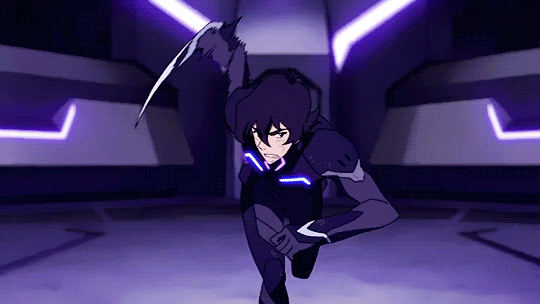
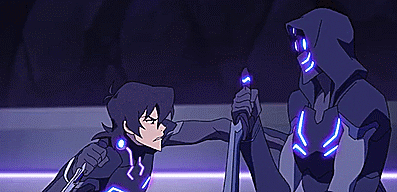
Voice Acting: As always, the cast on the whole is expressive and talented. For this season’s standouts, I’ve got to give a shoutout to Steven Yeun (Keith), who knows how to cram a ton of emotion into quiet moments and short, often one-word responses — there is so much character development happening with him in Episode 8 that we get to see a lot of this come out, particularly in the sequences with his father and with Shiro.
Another shoutout goes to Cree Summers (Haggar) just for keeping one of the Big Bads of the series so interesting — it’s common for villains to be one-note in depiction and delivery, and Summers breaks that. In particular Haggar screaming “It’s pure quintessence!!” when she gets blasted in Episode 13 (“Blackout”) was thrilling just by itself! I suppose I’m all about this season’s performances that feature actors who can do so much with so little.
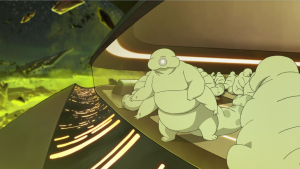 Low Points of the Season: In Episode 2, “The Deep,” we’ve got some merpeople with jellyfish masks that make them sound like talking bubble machines; and Episode 6, “The Ark of Taujeer,” we’ve got the Taujeerians, a planetary people that resemble boogery water bears and sound like monotone robot synthesizers; then Episode 11 “Stayin’ Alive,” a brief appearance from the Balmerans with Ye Mangled Olde English. What do they all have in common? I cringe whenever they speak.
Low Points of the Season: In Episode 2, “The Deep,” we’ve got some merpeople with jellyfish masks that make them sound like talking bubble machines; and Episode 6, “The Ark of Taujeer,” we’ve got the Taujeerians, a planetary people that resemble boogery water bears and sound like monotone robot synthesizers; then Episode 11 “Stayin’ Alive,” a brief appearance from the Balmerans with Ye Mangled Olde English. What do they all have in common? I cringe whenever they speak.
As far as a low point with a little more substance, by the end of Episode 8, we know Keith is Galran (strongly hinted it’s matrilineal). That’s…kind of a big deal. How does Team Voltron handle this bombshell?
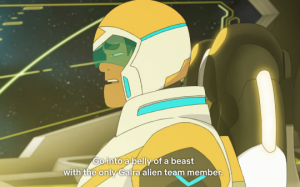 For the rest of the season, with the exception of teasing from Hunk in Episode 9 (“Belly of the Weblum”) and Allura being an ice queen to him until her apology in Episode 12 (“Best Laid Plans”), nobody ever talks about Keith being Galran. Nobody reacts to Keith being Galran. This felt like a missed opportunity for the other characters to come out and say something along the lines of, “Despite all this, nothing’s changed; you’re still our Keith.” I thought for certain Shiro would say something like this, but nope.
For the rest of the season, with the exception of teasing from Hunk in Episode 9 (“Belly of the Weblum”) and Allura being an ice queen to him until her apology in Episode 12 (“Best Laid Plans”), nobody ever talks about Keith being Galran. Nobody reacts to Keith being Galran. This felt like a missed opportunity for the other characters to come out and say something along the lines of, “Despite all this, nothing’s changed; you’re still our Keith.” I thought for certain Shiro would say something like this, but nope.
Yet I understand why the creators opted not to dwell on this character reveal — one of season’s two themes is “we are all made of the same cosmic dust,” and that means our characters are learning that more things connect than divide us; that it’s not so much what we are, but who we are that matters. Allura’s apology sums up another season theme: “It’s not what’s in your blood. It’s who you are that counts.” This is a great message, so I can’t be too bummed about the lack of reaction — in a perfect world, constructs like bloodlines, parentage, and race shouldn’t be notable. Honestly, the more I think about it, I think the only reason why I’m miffed is that waaaay more time was devoted to Team Voltron reacting to Pidge being a girl in the first season than Keith turning out to be Galran. We clearly know how each team member feels about Pidge; we didn’t get that with Keith.
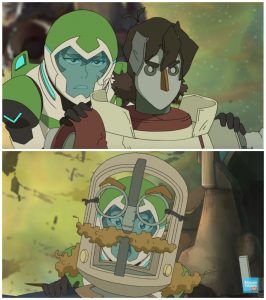 High Points of the Season: Episode 1, “Across the Universe,” has some of the funniest moments of the season. While Shiro and Keith are fighting for their lives on the planet they’ve crash landed, Pidge is stranded on a “trash nebula,” and to kill time she constructs Team Voltron out of spare parts and impersonates each member. My favorites are when Pidge does Keith (“My name is Keith. I’m so emo.”) and Coran (“Blah, blah, blah! Crazy words. Mustache!”).
High Points of the Season: Episode 1, “Across the Universe,” has some of the funniest moments of the season. While Shiro and Keith are fighting for their lives on the planet they’ve crash landed, Pidge is stranded on a “trash nebula,” and to kill time she constructs Team Voltron out of spare parts and impersonates each member. My favorites are when Pidge does Keith (“My name is Keith. I’m so emo.”) and Coran (“Blah, blah, blah! Crazy words. Mustache!”).
Meanwhile, Princess Allura and Coran are stuck in the collapsing wormhole and encounter a sort of space-time flux where they’re forced to repeat the exact handful of minutes over and over…except the Altean mice mutate and Coran ages backwards. When Coran is a toddler and then a baby, his voice (done by an actual child) is soooo cute.
I also enjoyed scenes in Episode 10 (“Escape from Beta Traz”) between Shiro and Slav. Slav, the genius mathematician who has gone a little “space crazy” from calculating infinite quantum realities and the probabilities therein, is a key component in the plan to defeat Zarkon, and Shiro, Lance, and Pidge are tasked with breaking him out of a Galran prison.
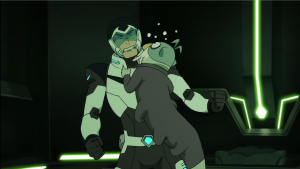 It might seem like Slav is a fluff character because he’s mostly played for comic relief, but he’s an introduction to the idea of multiverses and alternate realities, which will be very important throughout the course of the series. I mostly love Slav because he makes the ever-stalwart, stoic Shiro go crazy: “[…] Count your hair follicles or fluff a pillow, or whatever you need to do to make sure we survive the wormhole trip in this reality!”
It might seem like Slav is a fluff character because he’s mostly played for comic relief, but he’s an introduction to the idea of multiverses and alternate realities, which will be very important throughout the course of the series. I mostly love Slav because he makes the ever-stalwart, stoic Shiro go crazy: “[…] Count your hair follicles or fluff a pillow, or whatever you need to do to make sure we survive the wormhole trip in this reality!”
Final Thoughts: One of the benefits of doing a rewatch of a series you love is that with the help of hindsight, you can catch the foundations being laid for what’s to come. I know how the series ends; I know what happens to everyone, and now that I’m armed with knowledge it becomes easier to see how a line of dialogue uttered in Season Two can help justify a major character choice that occurs six seasons later. The creators of Voltron: Legendary Defender are playing the long game, where something that seems inconsequential or played for laughs has significance or sets precedence. It makes me love this show even more.
 That aside, QUIZNAK! What a season-ender! Team Voltron’s big plan to take down Emperor Zarkon saw great success, but not without great loss. Over the course of the season, three substantial allies in the Blade of Marmora were killed in battle; and while Zarkon isn’t dead, he’s pretty darn close to it. We’ve learned that an Altean is Zarkon’s right-hand woman, and her power with the Komar can strip the quintessence from living beings and entire planets.
That aside, QUIZNAK! What a season-ender! Team Voltron’s big plan to take down Emperor Zarkon saw great success, but not without great loss. Over the course of the season, three substantial allies in the Blade of Marmora were killed in battle; and while Zarkon isn’t dead, he’s pretty darn close to it. We’ve learned that an Altean is Zarkon’s right-hand woman, and her power with the Komar can strip the quintessence from living beings and entire planets.
We were warned that being a Paladin of Voltron is more than just flying a giant robobeast — it’s a psychic connection, and powered by quintessence, which is an aetherial substance that composes the universe — and that there are an abundance of risks that come with battling in it. Sure enough, at the season close, the Paladins have won the battle, but the Black Lion is empty, and its pilot — the leader of Team Voltron — is gone. Take that painful blow, and then add in this delicious piece of mystery, the final words uttered this season:
Summon Prince Lotor.
…Now you’ve got an ending with more questions than answers and plenty of motivation to keep watching. I hope you join me for the Season Three rewatch — we’ve got the introduction of one of my favorite charismatic villains coming up. See you soon!

No Comments